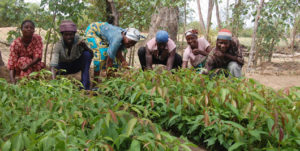Include sustainable agricultural intensification needs in input subsidy programmes – Farmers
 Farmers in the Upper West Region have called for the inclusion of sustainable agricultural intensification (SAI) needs in the government’s input subsidy programmes to enhance production and ensure food security.
Farmers in the Upper West Region have called for the inclusion of sustainable agricultural intensification (SAI) needs in the government’s input subsidy programmes to enhance production and ensure food security.
They say, if government is able to effectively tackle the annual increment in the price of fertilizers, include commercial compost in the subsidized inputs, provide transport and equipment for compost preparation and make available water sources for home compost making, they could do more with SAI.
With dramatic changes in the weather pattern and dwindling land resources, most farmers in the Region understand that the only way to survive the harsh conditions is to explore sustainable means of increasing production.
Although there is the general understanding that change might not come cheap, especially in the implementation of the agro-ecological measures that make the best use of nature’s goods and services, many of them believe it is the way forward to achieve food security.
Agricultural production has remained basic with the use of hoe and cutlass. There is also heavy reliance on rain-fed agriculture while extension services for the farmers are almost non-existent.
These, combined with the growing family size and population, is increasingly making it difficult to access arable lands and not many farmers are willing to travel far distances into the bush to their farms.
Hitherto, farmers were able to maintain their soil, production levels and ensure their food security primarily through shifting agriculture and fallowing.
Currently, many households are forced to cultivate the same piece of acreages annually, resulting in soil fertility and crop yield decline. Such households are experiencing decreasing food and nutrition security.
Again, due to the lack of non-agricultural income opportunities and the long dry season (October to May), many people in the north leave the area to work in the southern part of Ghana for some part of the year.
The overall impact of this “year-in-year out” trend is low productivity with most smallholder farmers unable to feed themselves from one harvest season to the next.
Government’s response so far has been the supply of inputs on subsidized basis, especially fertilizer and hybrid seeds to address the low productivity and declining soil fertility.
Even at subsidized rates, the inputs are beyond the reach of the many farmers, especially the women.
Farmers like Geoffrey Kelle, who has become a reference point for farmers at Ko in the Nandom District for his unflinching support for Sustainable Intensification of Agriculture, insist that benefits are more than the sacrifice.
Kelle has been practicing sustainable land and water management, which was introduced to him by CIKOD under the SITAM project some few years ago, and represent a huge shift from the known-farming practices, such as bush burning, mounds and slash and burn, the farmers are used to and have applied over the years.
Now, the new move is to ensure non-burning of crop residues and to cover them in order to provide nutrient for the farm, apply compost to enhance soil fertility, make ridges to retain as much moisture as possible, bunds to prevent run-offs and keeping trees on the farm, as well as crop rotation.
Kelle says the new farming practice is labour intensive, imposes a great deal of stress and takes a toll on the meagre financial resources of the farmers.
For instance, in an area that water is so scarce, Kelle points out that farmers have to indulge the drudgery of travelling long distances to get water in order to prepare their compost.
“The preparation of compost for many farmers is the most difficult. Sometimes we have to carry the materials from the house to the farm and back. Farmers who can afford hire tricycles for such trips,” he adds.
Kelle and many of the farmers have come to appreciate the importance of the use of compost instead of the reliance on the government’s subsidized chemical fertilizers, the use of which is still low among the farmers because of the high cost, to boost soil fertility.
Unlike the compost, many believe that chemical fertilizers kill the soil organism and rob it of important nutrients needed for crop growth.
Nonetheless, some farmers are using the chemical fertilizer together with the compost, mostly on poor soils.
“I rely heavily on the use of compost on my farms because it guarantees soil fertility and is retained for three years before I apply again. I only use few bags of the chemical fertilizer as a supplement,” says Kelle.
Despite the challenges of change and adaptation to new ways of doing things, the farmers admit seeing the benefits of the transition from their old farming practices to SAI.
Mr. Vitus Bewelleyir, a farmer at Ko-Bukon claims his per acre maize yield, has increased to three bags per from the previous 1-1.5 bags, adding proudly that, the family is able to live on the produce until the next harvest season.
“We do not buy grains from the market to supplement anymore.”
Mr. Aa-ire Nangyir, a 33-year old farmer at Tanchara in the Lawra Municipality acknowledges that the adoption of the new farming practices has so far brought positive results but wants more pragmatic government support to help reduce the drudgery the farmers have to go through.
The major challenge of these farmers is that ecological farming although good, it is labour intensive.
Source: GNA
